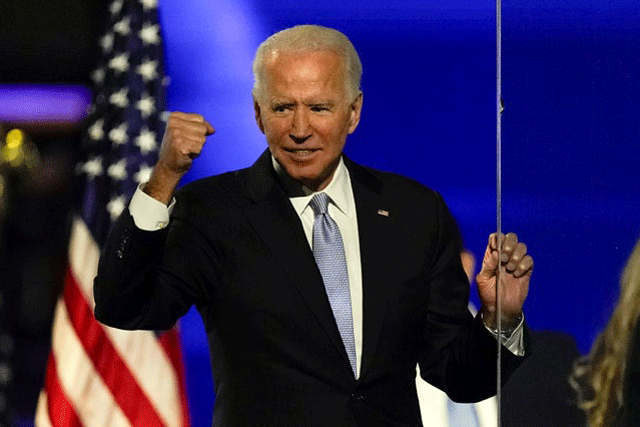
THE confirmation of Joe Biden as the 46th President of the United States of America on the evening of November 7 put paid to the anxiety that gripped the world in what almost appeared to be a tumultuous moment for one of the world’s biggest democracies.
COLUMNIST :TAPIWA GOMO
The election pitted Donald Trump, the outgoing President and former Vice-President Biden. The importance of this election cannot be overstated as there is so much at stake.
In the past four years Trump has been President of the US, his policies have had a huge negative impact on several countries, global organisations and individuals in his country. His tenure was marked by policies of protectionism which benefited American markets and the rich while denting global economies, mainly China.
It was also the same tenure which saw massive racial violence in the United States that spawned protests across the world and is still shaping policies on racial diversity.
While the American markets have grown fond of Trump as the economy grew under his term, overall, there are millions of people who wanted to see him go. Trump scores sub-optimally on moral issues which makes him unlikeable to many.
By the time the final election results were being announced, Trump was still in denial and insisting on allegations of fraud in the electoral process, yet to concede and pushing forward with the legal process to appeal the outcome. During a Press conference on November 5, Trump alleged that corruption was stealing “such an important election” from him.
He claimed he had the numbers to win the election even before the counting was completed. While these allegations were widely condemned as unfounded and baseless, and for their potential threat to the system of democracy in America, they also triggered a wave of comparisons with Zimbabwe among the trending references to autocracy.
- Chamisa under fire over US$120K donation
- Mavhunga puts DeMbare into Chibuku quarterfinals
- Pension funds bet on Cabora Bassa oilfields
- Councils defy govt fire tender directive
Keep Reading
Zimbabwe is approximately 14 320km from the US. Its economy is by far insignificant compared to America — a global powerhouse which spends nearly two billion dollars per day on defence.
The relationship between the two countries after the chaotic land reform in 2000 has been rocky with the US imposing sanctions on Zimbabwe for human rights abuses and other ills.
On November 1, the US government announced it would review, and possibly suspend, the generalised system of preferences (GSP) programme which allows Zimbabwe duty-free access to US markets since 1980.
The US claims a hold on the global template on democracy carved two centuries ago to which young countries such as Zimbabwe aspire. It is fair to argue that Zimbabwe has something, if not a lot, to learn from the US.
But this election has revealed how shameful and saddening it is that Zimbabwe has become a global example of bad politics. There is a lot happening in other parts of the world. There is Venezuela, Belarus, the Syrian crisis and others but it had to be Zimbabwe, the easier example to autocracy.
Responding to Trump’s Press conference allegations of electoral fraud, former US ambassador to the United Nations, Samantha Power drew similarities between Trump and former and late Robert Mugabe. Power tweeted that: “He is going full Robert Mugabe” in reference to Mugabe’s long stay in power and refusal to leave office.
Of course, this attracted its own debate on several fronts but the fact remains that Zimbabwe has become a point of reference for political mischief. These are not just statements as it is possible that Power may bounce back as a diplomat in Biden’s administration carrying the same views on Zimbabwe.
Richard Downes, a well-known Irish broadcaster and journalist echoed similar views tweeting that: “I’ve covered elections in many countries over many decades … the last time I remember a sitting president saying things like these was Zimbabwe in, I think, 2008”.
He was referring to the 2008 elections in Zimbabwe when results were withheld for a month. At a time when Trump is supposed to stand for his own ‘sins’, his behaviour is reminding others of how bad our politics is. Certainly, there is a need to sanitise our politics for purposes of retaining and maintaining our dignity as Zimbabweans.
Reacting to the head of Organisation for Security and Co-operation in Europe (OSCE) Michael Lin who accused Trump of being a “gross abuse of office”, Alex Finley a former CIA official also noted that such a comment “you would see from a country like Zimbabwe. So that’s fun.”
Perhaps, Patrick Radden Keefe, an author and a staff writer at the New Yorker, revealed what most in the media industry in Africa have always suspected that there are news templates reserved for covering African countries and those for Western countries.
He tweeted that: “It is so surreal/funny/demoralising to flip to BBC and recognise the gentle tone of patronising disappointment they generally reserve for coverage of elections in, say, Zimbabwe.”
Sadly, this view is not only limited to the ruling party but the opposition as well. Contrary to what the majority think that the opposition hob nobs with the US officials who purportedly view them as angels of democratic change, in a recent interview, Robert Swan Mueller, an American lawyer and former Special Counsel for the United States Department of Justice, likened Trump’s behaviour with that of opposition parties in Zimbabwe that cannot accept the outcome of elections. We need to sanitise our political image for the sake of our dignity.











